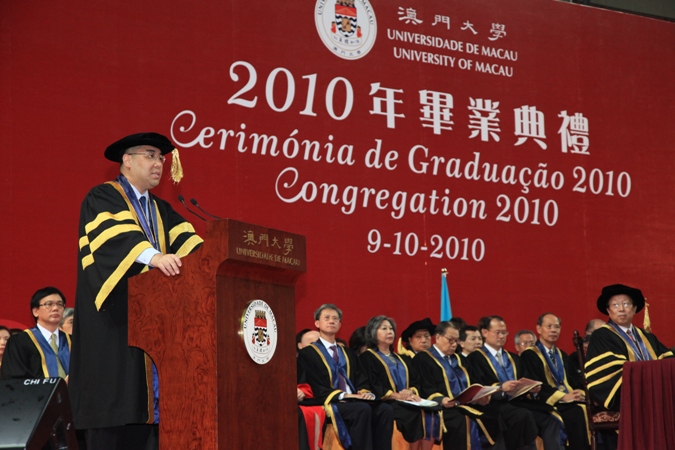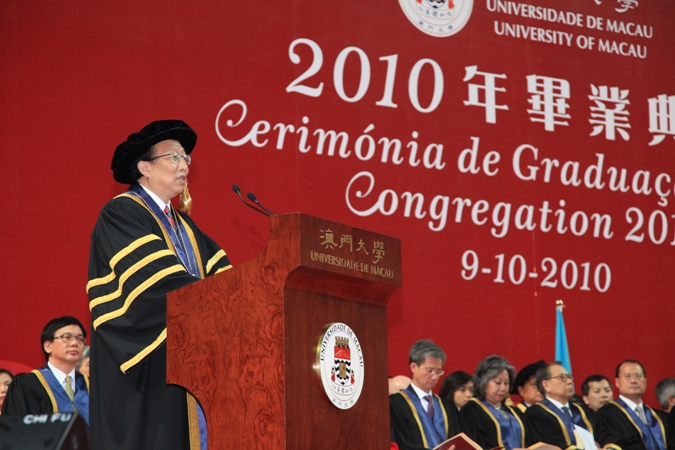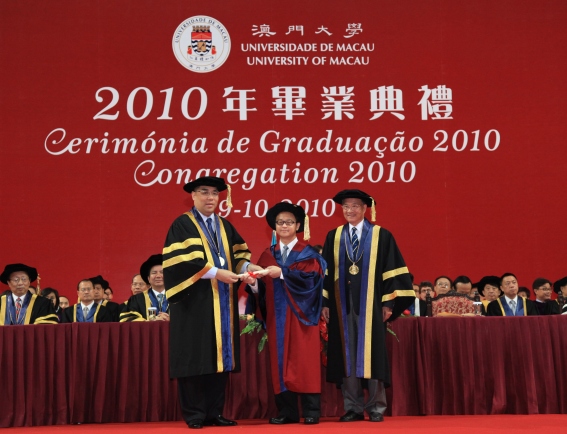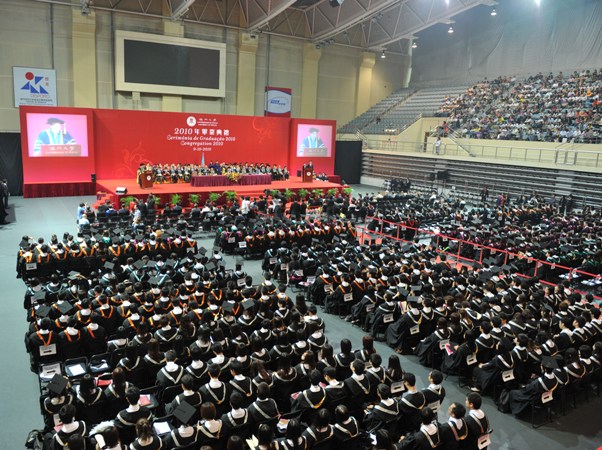|
|
|
|
| Chief Executive of Macao SAR and Chancellor of UM Dr. Chui Sai On says that UM should stick with its established long-term goals and strive to become a world-class university |
|
|
| UM Rector Wei Zhao says that UM has formulated a new “‘4-component-based’ structure” as the university’s new pedagogical model |
|
|
| Chief Executive of Macao SAR and Chancellor of UM Dr. Chui Sai On (left), accompanied by UM University Council Chair Dr. Tse Chi Wai, presents the doctoral degree certificate to a graduate |
This year UM produced more than 1500 graduates. The excellent performance of the graduates further strengthens UM’s determination and faith to “bring the ‘4-component-based’ model to perfection”.
Striving to become a world-class university
The University of Macau Congregation 2010 was held on 9 October 2010. At the congregation, Chief Executive of Macao SAR and Chancellor of UM Dr. Chui Sai On said that the Macao SAR government will adhere to the principle of “sustaining Macao’s development through investing in education” and will increase input in education. He said UM should stick with its established long-term goals and strive to become a world-class university and produce high-calibre graduates. Chui added that the government is studying the feasibility of establishing a higher education fund and will continue to provide postgraduate scholarships for permanent Macao residents to create favorable conditions for people who wish to pursue further education. He said the aim of doing so is to create a society committed to lifelong learning. He noted that the construction of the new UM campus will be completed in three years, and that UM should stick with its established long-term goals and strive to become a world-class university with distinctive regional features and constantly seek to enhance the quality of its graduates.
Formulating a new ‘4-component-based’ pedagogical model
UM Rector Wei Zhao noted that “a top-notch university must be one which, first and foremost, is committed to providing a first-rate education”. He said he believes that a good university should not be “a supermarket where credits are up for sale”. He said that’s why UM has formulated a new “‘4-component-based’ structure” as the University’s new pedagogical model.
Rector Wei Zhao said: “The first component is disciplinary education. Being one of the pillars to the societal and scientific developments, specialism plays an integral part in human development. It is a defining feature of university education. Hence, the provision of disciplinary education according to the ways jobs are specialized in a society and the disciplinary development arising therefrom is both reasonable and necessary. We must improve and strengthen the curriculum of our disciplinary education.”
“The second component is general education. General education is a breakthrough from the traditional domain of disciplinary education. Its purpose is to nurture well-rounded talents who are erudite and integrating. In order to realize the mission of providing a ‘holistic education’, we have introduced, beginning in 2008, a general education programme as part of the reform of our undergraduate curriculum. The programme is now being launched on a trial basis and will be fully implemented in September 2011.”
“The third component is research and internship education. The world today is an ever changing ‘knowledge-based’ society. The conventional ‘spoon-fed’ education model is no longer able to cope with today’s ‘knowledge-based’ society. Nowadays, the capabilities of students not only emanate from being at the receiving end of knowledge, but also from their ability and initiative to create knowledge. The University will therefore launch an innovative undergraduate research and internship programme with emphasis on innovation and practicality. Our students will be provided with more opportunities for research internship. In addition, we will also increase the funding for Research and Development to provide more resources for various fields of research. We will strive for research par excellence, enlarge our research team and elevate the standards of research in Macao. In the area of microelectronics for instance, some of our undergraduates’ research achievements have been published in top-level academic conference proceedings and scientific journals. Furthermore, some students have won awards in regional and worldwide scientific competitions.”
“The fourth component is community and peer education. It is a type of education system that builds on student residence on campus. Such education is related to the ‘residential college system’ which is practiced in many prestigious universities around the world. The educational benefits through this kind of communal activities come in an osmotic fashion. It works by forging a small and closely knit environment where students of different ages, ethnicities and specialism are all engaged in interactive communal activities such as socializing and studying. From our experience, such education can strengthen interaction among students. It brings positive influence to students in the course of their formation of a good character, a positive value system and their cultivation of academic interests. Because of its importance, we initiated a pilot scheme for two Residential Colleges in September 2010. In our new Hengqin campus, the construction of Residential Colleges will also be the core of the project. In fact, our University is the first university in Asia that will fully implement the Residential College system.”
Graduates’ excellent performance strengthens UM’s faith to bring the ‘4-component-based’ model to perfection
Rector Wei Zhao stressed that “disciplinary education”, “general education”, “research and internship education”, and “community and peer education” are all essential components indispensable to the growth of students, and that UM has formulated this new ‘4-component-based’ structure” as the university’s new pedagogical model with a view to nurturing graduates who, “with integrity and aspiration, can live up to the maxim of ‘love China, love Macao; learn extensively, practice earnestly’ and be the driving force for the development of the society”. He said that for years UM has been holding on to this education mode and has accumulated rich experience in this respect. He said the excellent performance of the graduates further strengthens UM’s “determination and faith to bring our ‘4-component-based’ model to perfection”. In closing, Rector Wei Zhao congratulated students on entering a new stage of their lives and reminded students to always bear in mind that their great responsibilities for Macao, China and the world, saying that such responsibilities “are best discharged by the contributions” they make to the alma mater and society.
Students look forward to seeing the alma mater’s new milestones
Student representative Ms. Mak Hio Wa said in her speech that UM has all along been committed to nurturing excellent graduates for society and has attained marked progress over the years. She said that she believes the new campus will offer a better learning environment for students and will allow UM to make greater contribution to society by nurturing more outstanding graduates. She expressed hope that several years from now all students present at today’s ceremony can reunite to celebrate new milestones of their alma mater. In closing she wished UM a brighter future.
More than 1500 graduates, their parents and guests attended the congregation
This year UM produced a total of 1522 graduates, including 1107 bachelor’s degree graduates, 276 master’s degree graduates, six doctoral degree graduates and 133 graduates of postgraduate certificate programmes. At the congregation, UM presented numerous academic awards and scholarships to students with academic excellence.
The congregation was held at the Tap Seac Multi-Sports Pavilion. Dr. Chui Sai On, accompanied by UM University Council Dr. Chair Tse Chi Wai, Rector Prof. Wei Zhao, Vice Rector (Academic Affairs) Prof. Simon Ho, Vice Rector (Research) Prof. Rui Martins, and Vice Rector (Administration) Dr. Alex Lai, presided over the ceremony. More than 2000 people, including members of the the University Assembly and University Council, UM staff, government officials, community leaders and students’ parents, attended the congregation, joyful in the knowledge that this milestone event signals the start of a new chapter in the students’ lives.





